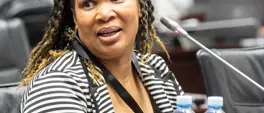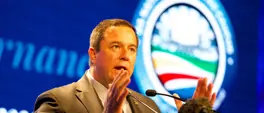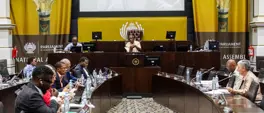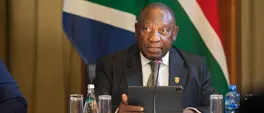MALAIKA MAHLATSI: Should society eternally punish and shun GBV perpetrators like Chris Brown?
Malaika Mahlatsi
4 October 2024 | 12:23Not all GBV perpetrators are beyond rehabilitation. We can and should redeem others – especially when they are willing to do and be better, writes Malaika Mahlatsi.
Two weeks ago, American singer and actor, Chris Brown, announced that he would perform in South Africa in December 2024. While many of his fans are excited at the news, there is a section of the South African populace that is aggrieved by it, arguing that Brown should be cancelled due to his history of domestic violence.
In 2009, Brown assaulted his then-girlfriend, singer and businesswoman Rihanna, leaving her with facial and bodily injuries. She was hospitalised. Brown, who had handed himself over to the Los Angeles Police Department (LAPD) was charged with felony assault and pleaded guilty. He was sentenced to five years probation and six months of community service.
Brown was also required to undergo mandatory domestic violence counselling for one year. He and Rihanna rekindled their relationship before breaking it after just a few months. A few years later, in 2017, Brown was involved in another case involving an ex-girlfriend, Karrueche Tran, whom he had threatened with violence following their break-up. Tran was granted a five-year restraining order against Brown.
Amid the proven accusations of domestic violence, Brown has also been a victim of false accusations by at least two women. In 2016, a woman accused him of threatening her with a firearm and violently kicking her out of his house.
The LAPD was called and Brown was later arrested and released on bail. But after an extensive investigation, the allegations were proven false and the charges against him were dropped. Six years later, in 2022, Brown was accused of raping a woman on a yacht in Miami.
The woman attempted to sue the singer for US$20 million (approximately R40 million). However, after Brown produced evidence of the consensual relationship between the two, which included text messages from the singer and naked photographs, all sent shortly after the alleged rape took place, the accuser dropped the case.
Brown initially attempted to counter-sue her for defamation of character, but later dropped the suit. Brown has also been involved in other cases of violence, including a 2013 assault on a man who had tried to take a photo with the singer. Brown punched the man, breaking his nose. For this, he was charged with a misdemeanour and spent just over a day in a county jail in Washington D.C.
Brown’s history of violence has led to calls for him to be banned from performing in South Africa. Women for Change, a non-profit organisation (NPO) advocating against gender-based violence and femicide (GBVF) in South Africa, has created an online petition to have Brown’s upcoming shows in the country cancelled.
The organisation has called on the South African government to intervene, arguing that Brown’s performance would undermine efforts to fight against GBVF in a country struggling with the problem. An excerpt from the petition reads: “His concert is scheduled just days after the global commemoration of the 16 Days of Activism Against Gender-Based Violence, making this event a direct insult to the millions of women and girls affected by violence in South Africa and worldwide”.
The petition goes on to say: “We also raise serious concerns about how the Department of Home Affairs has granted a visa to a convicted abuser. As a nation committed to fighting GBVF, how can we justify providing a platform to someone with a known history of abuse? We must send a message that South Africa stands with survivors, not perpetrators”. By midday on Friday, the 4th of October 2024, the petition had gathered nearly 6,000 signatures.
There is no question that the concerns raised by Women for Change have a great degree of legitimacy. The scourge of GBVF in South Africa has been described as a pandemic – and rightly so. GBVF is a widespread problem and profound problem in our country, with hundreds of thousands of women, possibly even millions, being victims of it.
According to the latest quarterly crime statistics from the South African Police Service (SAPS), violent crimes against women, such as rape, are on the increase. Between April and June this year, 11,566 sexual offences were reported.
This includes 9,309 cases of rape, 1,496 cases of sexual assault, 592 attempted sexual offences and 196 contact sexual offences. During this period, 966 women were murdered and there were 1,644 cases of attempted murder against women reported. Additionally, 13,757 women were assaulted with intent to cause grievous bodily harm. All three crime categories increased by almost 7% from the previous years.
As I follow the debates and discussions about the Women for Change petition, I find myself wondering whether or not society should assume an absolutist position on perpetrators of GBVF - a position that they should be permanently punished and shunned. This may sound controversial, but I do believe it does beg for engagement.
Research indicates that the ultimate driver of GBVF is gendered power inequality that is rooted in patriarchy. Gender-based violence, and intimate partner violence (IPV) in particular, is more prevalent in societies where there is a culture of violence, and where male superiority is treated as the norm.
According to a study by Safer Spaces, a belief in male superiority can manifest in men feeling entitled to sex with women, strict reinforcement of gender roles and hierarchy (and punishment for transgressions), women having low social value and power and associating masculinity with control of women.
The same study contends that these factors interact with several drivers, such as social norms (which may be cultural or religious), low levels of women’s empowerment, lack of social support, socio-economic inequality, and substance abuse.
An evidence report published by the Institute of Development Studies in 2015 further states that it “pervades the political, economic and social structures of society and is driven by strongly patriarchal social norms and complex and intersectional power inequalities, including those of gender, race, class and sexuality”.
Research is clear that perpetrators of GBVF are products of a heteronormative patriarchal society and that gender relations are fundamentally power relations. A society that privileges men inherently subordinates women, and it is in this subordination that women’s dehumanisation, manifested through violence and other forms of abuse, occurs.
Thus, the elimination of GBVF depends on dismantling structural and institutional constructs that produce, enable and reproduce the subordination of women. Men, who are perpetrators and beneficiaries of these structures, must necessarily be part of the solution to GBV. Women do not murder, assault or rape themselves.
For this reason, dismantling these toxic structures must involve men. Interventions such as domestic violence counselling for men are important because these men - products of political, economic, social and social constructs that subordinate women – must be resocialised to think differently as we fight for a society in which women can exist as equal and complete humans.
The question must then be asked when such men undergo the necessary interventions and receive the much-needed support to unlearn patriarchy and its manifestations, should they still be shunned and permanently punished?
It is a difficult question to contemplate given the impact that GBVF has on women and their families – millions of whom have been killed.
However, it is an important question to ponder considering the interventions proposed to deal with GBVF. Furthermore, the government of South Africa invests millions of rands in programmes within Correctional Services to rehabilitate criminals, including perpetrators of GBVF.
The ultimate aim of this rehabilitation is to re-integrate them into society. This re-integration is only possible if they become functional and useful members of society.
But this depends on society’s willingness to give them a second chance rather than being shunned and perpetually punished. This may not hold for all perpetrators, some of whom may need to be incarcerated without the possibility of parole.
But I submit that not all GBV perpetrators are beyond rehabilitation. We can and should redeem others – especially when they are willing to do and be better.
Malaika is a geographer and researcher at the Institute for Pan African Thought and Conversation. She’s a PhD candidate at the University of Bayreuth in Germany.
Get the whole picture 💡
Take a look at the topic timeline for all related articles.

















